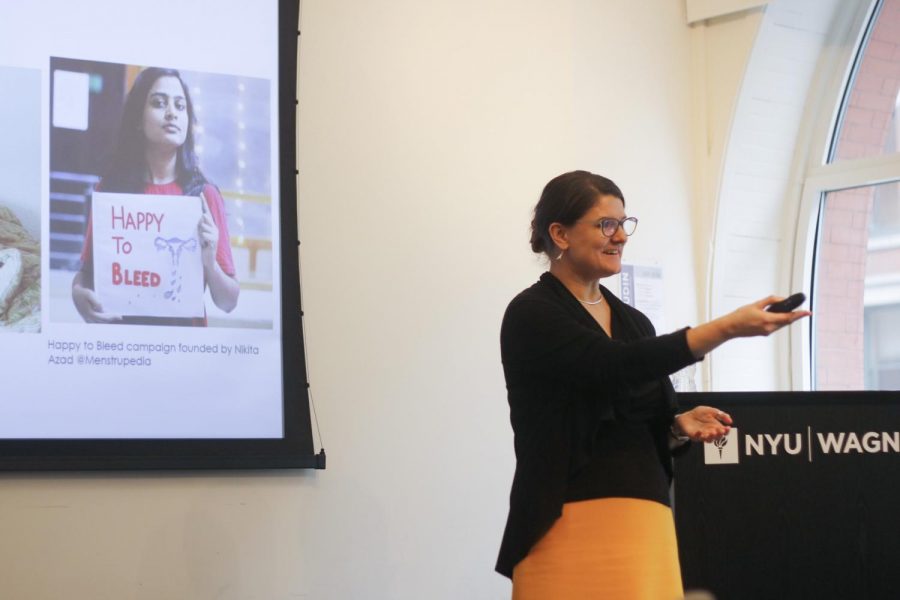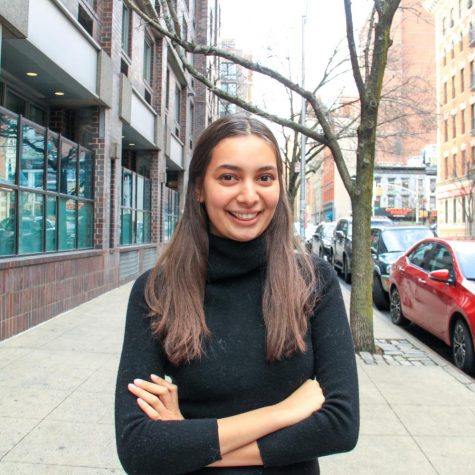Against the backdrop of NYU’s implementation of free period products in every dorm, human rights professionals spoke Tuesday about the growing importance of menstruation rights around the world.
In a series sponsored by the Center for Human Rights and Global Justice at NYU Law and the NYU Wagner Graduate School of Public Service, the Conflict, Security and Development Series examines new research and discusses policy approaches in conflict situations.
Dr. Igna Winkler, lecturer at the Institute for the Study of Human Rights at Columbia University, spoke on the increased attention menstrual health has gained in conversations about global developmental and human rights. Winkler credited this rise to popular media and through advocacy efforts for opening the conversation.
“There is a lot of momentum around menstruation nowadays,” Winkler said in her talk. “Big magazines like Cosmopolitan are starting to change their attitudes and make menstruation in popular culture more acceptable.”
But cultural stigma surrounding periods persists.
“It is the inherent problem that people believe periods are impure and dirty,” Winkler said. “Menstruation is not often seen as a positive thing but rather something women must hide.”
Winkler, who previously worked in the United Nations Repertoire on Human Rights and Sanitation, argued that clarity is something that is missing in the conversation about menstruation as a human right.
“While resolutions have generally included menstruation as a human right in regards to sanitation, we have to be explicit about what we are asking for,” Winkler said. “We should show what menstrual blood looks like and talk about menstrual products like any other sanitary product.”
Winkler also highlighted the necessity of menstruation awareness for a range of people, including transgender and gender-nonconforming, non-binary, homeless menstrators and others.
“Ultimately, all of this relates back to menstrual stigma.” Winkler said. “The human rights framework gives us the opportunity to address marginalization through a policy standpoint and through voice and agency.”
NYU students who attended the event discussed their own experiences with handling periods.
Pooja Banarjee, NYU Wagner alumnus ‘18, spoke about how periods can impede one’s ability to concentrate on their education.
“While I have never experienced my period affecting my access to education, I know that it affects a lot of people,” Banarjee said. “I come from a place of privilege that both my parents were open about it, so I never felt the need to hide it. But just the idea of going to school and dealing with that and not having the proper tools is difficult.”
Mehek Yusufzai, a second year MBA Health Policy and Management student at Wagner, believes that menstrual products should be provided more freely to raise awareness and mitigate stigma surrounding periods.
“I know that dorms and Wagner offers period products for free which is great,” Yusufzai said. “At the same time, Kimmel, Stern and other buildings require you to pay or sometimes don’t even offer. It seems that these initiatives are often targeted towards people who would already ask but are not being implemented in other important spaces.”
This, as Winkler spoke about, is the problem that has inflicted period products normalization.
“What we need is sexuality education and menstrual literacy from a young age, where everyone is in the room. Only then can all spaces truly be accessible,” Winkler said. “I’m glad to see students and people in general calling upon their institutions to do better.”
Email Mina Mohammadi at [email protected].

























































































































































